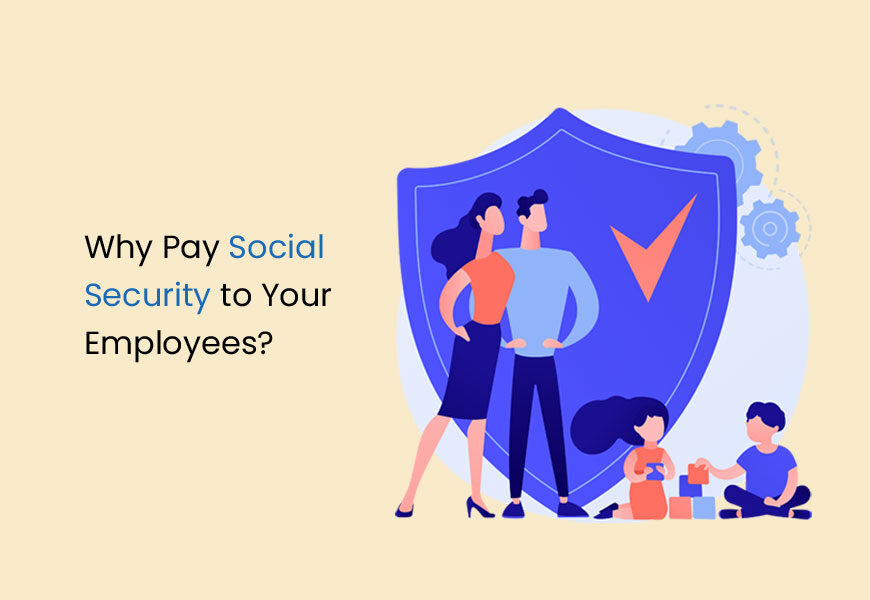Social security benefits are often looked at as retirement benefits. But social security is a much wider concept and includes a wide range of benefits that offer a safety net to individuals in the face of contingencies, emergencies and retirement. These benefits extend to not just an employee but their family as well.
Why should an employer pay social security? Mostly, because of legislation.
In the case of workers in formal employment, it is a regulatory requirement mostly. So, employers don’t have an option but to provide social security benefits. In case of informal employment in the organized and unorganized sectors, social security benefits are not mandated by law.
This means a vast majority of India’s population, 93% of India’s workforce to be precise, don’t have access to social security benefits. This includes the growing population of domestic workers, household staff, casual and contract labourers, gig workers, platform workers and so on.
So, should only employers who are mandated by law provide social security to their employees?
No.
Even when it is not compulsory, employers should contribute towards social security benefits for their workers. It is immensely beneficial and offers significant business value. Keep reading to know more on social security benefits and the value they generate for employers.
What Is Social Security?
Social security, broadly speaking, is a contribution-based system to provide healthcare, retirement, insurance and other benefits to employees and their households. It enables individuals and their families to gain a level of financial security in case their sources of income are:
- disrupted by force majeure events like the global pandemic, war, natural disaster, etc.
- terminated due to retirement, work injury, disability, invalidity, death of the primary breadwinner, etc.
- drained due to a major expense like children’s education, a family member’s health expense, maternity, etc.
As per ILO, the fundamental aim of social security is to provide a sense of confidence to individuals and their families that their standard of living and quality of life will not be greatly eroded by involuntary loss of income or any socio-economic eventuality. It doesn’t just seek to help individuals meet their needs as and when they arise. But it aims to address and prevent risks they may face, giving them a sense of economic security.
What Does It Constitute?
Social security and its constituents vary widely across countries. In countries like China, it is only a premium payment for insurance into government funds. In UK, it simply refers to the statutory cash benefits offered. In India, it includes a number of social insurances such as:
- Healthcare insurance and medical benefits
- Maternity benefits
- Disability benefits
- Pension
- Gratuity, etc.
What Laws Exist in This Regard in India?
The Employees’ State Insurance Act, 1948 (ESI Act) to offer comprehensive medical care to employees and their families that includes, but not limited to sickness and maternity benefits, disablement benefits, dependents benefits, etc.
The Employees’ Provident Funds & Miscellaneous Provisions Act, 1952 (EPF & MP Act) to extend provident fund, superannuation pension and family pension post retirement or in case of death of an employee during service.
The Employees’ Compensation Act, 1923 mandates compensation to an employee or their family in case of death or disability caused by employment injuries.
The Maternity Benefit Act, 1961 ensures 12 weeks of paid maternity leave and benefits to women workers. It also extends paid leave to women in case of other related contingencies such as miscarriages.
The Payment of Gratuity Act, 1972 provides 15 days’ wages per service year to employees who worked 5+ years in an establishment.
Separate legislations also exist for certain industries and categories of workers such as tea plantation workers, coal mine workers, etc.
The Code on Social Security 2020 seeks to subsume the above and other enactments into a combined social security to all employees across industries including unorganized sectors.
The Benefits of Social Security for Employers
So far, we have only been highlighting how critical social security benefits are to employees. Here is a list of power-packed benefits to employers who pay social security, whether or not they are mandated by laws or court orders.
Shows Your Workers That You Care About Them and Their Families
Social security benefits make healthcare accessible to employees and their families including comprehensive medical, sickness, maternity, disablement and dependent benefits. Schemes such as ESIC also provide funeral and confinement expenses. Social security also makes retirement benefits and life insurance accessible to employees and their families.
The wide range of informal workers such as drivers, household staff, domestic workers, peons, casual labourers, platform workers and so on often live in poverty. Even those who aren’t below the poverty line are extremely vulnerable; they may slip into poverty if a major expense such as hospitalization occurs, or they lose their primary source of income.
By paying social security, you are providing them a sense of security and immunity in the face of medical emergencies, contingencies, natural disasters and black swan events like the covid pandemic. When you make social security benefits accessible to employees, it shows your employees and their families that you care about their well-being.
Nurtures Trusting, Long-Term Relationships with Workers
The challenge with most informal employment is that it is difficult to engage workers or build long-term relationships with them. They are often underpaid, overworked and worried about the constant deluge of expenses they have to shoulder. When you pay social security benefits even when you are not required by law, it lays the foundation for stable labour relations.
By letting them know you stand with them through the ups and downs of life, it helps you establish trust. Social security benefits, thus, help you nurture trusting, long-term relationships with your workers.
For instance, we saw a vast majority of informal, casual and migrant workers suffer during the covid pandemic and the lockdown. In the face of the economic downturn, many employers were not able to keep paying their employees or help them through medical emergencies.
Employees suffered without sufficient income and no safety cushion to fall back on. If social security were accessible to these employees, they would have been able to survive the pandemic. By paying social security to employees, you can avoid such situations in the future, thus, building trust.
Higher Productivity and Output
Growing evidence shows that social security benefits boost employee productivity and output. In fact, employee productivity improves 20% when you pay social security. Why so?
Because they will be focused completely on work, rather than being constantly worried about home, their financial problems, children’s education and so on. With social security benefits, they have a safety net and will not be as stressed about their familial and financial situation.
More Loyal Employees and Better Retention
As mentioned earlier, paying social security benefits shows your employees and families that you care for them and helps you to build stronger, trust-based relationships with them. By overcoming the affinity problem, you can improve employee loyalty.
Loyal employees don’t constantly look for greener pastures. They are much more focused, dedicated and happy to work. This helps lower attrition rates among employees, especially those in informal employment. So, paying social security benefits improves retention by 51%.
Lower Absenteeism
The most common causes of absenteeism among employees, especially those in informal employment, are
- Sickness
- Poor health of a family member
- Stress from sudden or impending expenses such as children’s education
- Childcare issues, etc.
By providing social security benefits, you can lower absenteeism by 43%. Social security benefits make healthcare, insurance and retirement benefits accessible to them.
By making healthcare accessible to employees, you can ensure that they get the right treatment at the right time for themselves and their families. They will not have to avoid treatment for the lack of resources. Secondly, they would be spending less time waiting at hospitals where they may not be given priority and/or proper treatment. Overall, employees will be healthier and will be absent less often.
Improves Employer Brand
Paying social security benefits, even when you aren’t mandated to, helps you to boost your employer brand. You will be seen as a caring employer who is trusted by employees who are loyal to you. You will be able to attract and retain the right employees with the right skills. Social security benefits improve your recruitment by 57%.
You Will Contribute to Greater Societal Good and Progress
Last but not the least, you will contribute to the greater societal good and progress by paying social security to your employees. Without out-of-pocket medical expenses, employees can save and use money for children’s education, skill building and well-rounded development. They can save for their retirement, which means there will be fewer elders in poverty or being forced to work in their old age. Further, you will contribute to formalizing work and providing financial security for informal workers.
The Way Forward
Regardless of whether you are required to, you should pay social security benefits to all your employees, formal and informal. If you want to start contributing to the welfare of your employees but don’t know how to, TankhaPay can help.
Or
Download the TankhaPay app now





















